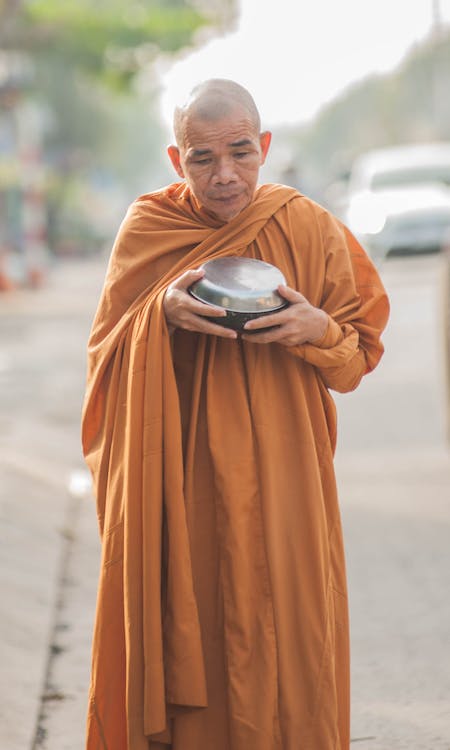
Looking the precept up simply as a translation from the Bramajala Sutra from which our Soto Zen sixteen precepts come, we get something pretty straight forward:
“Not to be stingy, or encourage others to do so.”
Looking to versions offered by contemporary western Zen teachers we find a variety of angles. Perhaps with a bit more nuance than we might assume.
First, from Robert Aitken, the root teacher of our community:
“I take up the way of not sparing the Dharma assets.”
He comments on this, “The Dharma assets are all phenomena in their precious uniqueness, the interdependence of everything in perfect harmony, and the absence of any abiding self. When I am not stingy with the Dharma assets, I conduct myself and say things that enhance my own understanding of uniqueness, harmony, and peace – and understanding on the part of others, so that my family members, friends and everyone and everything can maintain their path of perfection. Another way to say this is: I conduct myself so that the original perfection becomes more and more clear to all beings.”
There’s a lot to unpack in that, starting with the assertion of our radical interdependence.
Continuing with contemporary washes, Daido Loori offers: “Give generously; Do not be withholding.”
Bernie Glassman offers: “Using all of the ingredients of my life. This is the precept of Not Being Stingy.” I’ve always found his introduction of “ingredients” and the flood of cooking images it raises for me kind of wonderful.
Jiyu Kennett gives us “I will refrain from holding back in giving either Dharma or wealth.” With her own comment immediately following, “Since charity is the first sign of enlightened action, how could I practice stinginess in any form whatsoever?” She weds the two uses of generosity we come across in versions of this precept, materially and spiritually.
Norman Fischer collected three versions. I’m not really sure where the first two come from.
“Not to be possessive of anything but to be generous.”
And then, “Since there is nothing we can possess, especially others, we approach the world and each other with open hands.”
I love the image of open hands which is often used in comments on the tenth oxherding picture, the description of enlightened activity in Zen’s great map of the spiritual life.
Then he adds as a third version, the comments that come to us through Eihei Dogen. By the bye, Dogen appears to be the actual source for the sixteen precepts we use. While the ten grave precepts are straight from the Bramajala Sutra, adding in the three refuges and the so-called three pure precepts, and taking all of them together as the “sixteen bodhisattva precepts;” well, while he says it comes from his Soto teacher Rujing, it appears the scholarly community is largely in agreement it comes from Dogen.
Still, they are ours. And taken. Together are rich. But, back to the eighth.
First Dogen cites Bodhidharma saying, “Self-nature is subtle and mysterious. In the genuine, all-pervading Dharma, not being stingy about a single thing is called the Precept of Not Sparing the Dharma Assets.” Then Dogen adds, “One phrase, one verse – that is the ten thousand things and one hundred grasses; one dharma, one realization – that is all Buddhas and Ancestral Teachers. Therefore, from the beginning, there has been no stinginess at all.”
There you go, from the horse’s mouth. It’s all subtle and mysterious. Not being stingy, but being generous is the heart of the precept. The many things are all resolved within our boundlessness. So, subtle and mysterious, but expressed fully in every generous act.
So, what does this look like for us as spiritual practitioners? What does this mean for you and me in that rubber hits the road sort of way?
Well, I suggest the precept is a koan. Okay, they all are. Presentations and invitations. The wato, word-head or point of this eighth precept can simply be the word “generosity.” Or maybe “generous.”
But I also find we can approach it from another angle. Perhaps with another koan. One I’ve sat with over the years and have found useful addressing the same heart as the eight precept is case seven in the Gateless Gate.
A student of the way came to Master Zhaozhou and said, “I have just entered your monastery. Please give me instruction.” Zhaozhou asked, “Have you eaten your rice gruel?” The students said, “yes.” Zhaozhou responded, “Wash your bowl.”
And because it is a story from our ancestors who want us to get to the point, it concludes with the words: With this the student had an insight.
I’ve always loved this case in the Wumenguan, that grand twelfth century collection of koans, those mysterious questions used on our Zen way.
It features the great master Zhaozhou Congshen (Joshu in Japanese). Born at the end of the eighth century and living through most of the ninth, Zhaozhou is one of the signal figures in the formation of Zen Buddhism. He appears five times in the Gate anthology, starting with the very first case, the one about that dog and “mu,” a “no” that echoes through time and space.
I’ve sat deeply with this koan. I’ve investigated it as a student, and for the past however many years I’ve accompanied a goodly number of Zen students in their own investigation of what it can offer. And, I’d add, a few times when people have passed through formal koan introspection practice as we transmit it, when we come near the formal conclusion of the curriculum to the eighth precept as a koan, well, we find the bowl holds something for us, even when we’ve finished eating from it.
Giver, receiver, and gift. Love, lover, and beloved.
I’ve found this case endlessly rich. It certainly can open our hearts in a wide number of directions.
And, like any real koan, it can mislead the unwary. For instance, I’ve worked with several people who assume Zhaozhou is rebuking the student. One student even thought the master was annoyed at how his precious time was being wasted by the importuning of a novice. And the koan is a brush off. Another took a slight variation on that perspective and believed it was a sharp rebuff of someone hoping for a conceptual response to Zen’s fundamental questions of life and death. Better, perhaps. But barely. Actually pretty far from the heart of the matter.
Rather, I’ve found “Wash your bowls” an invitation into the very heart of generosity. The heart of the eighth grave precept.
The technical term in Buddhism for generosity is dana. That word dana is constellated with similar meanings in the other Indian religions, the Dharmic traditions, Hinduism, Jainism and Sikhism. And each of these traditions shades the point of generosity somewhat differently.
For Buddhists dana is principally a spiritual practice. And as a practice it ranks with our moral precepts and our meditative disciplines. As Buddhism, and particularly of concern for me, Zen Buddhism matures into its Western expressions we seem to have come to these practices one at a time. Our interest in awakening. Our interest in meditation. Our interest in the life of the way.
First awakening and meditation. Then, for many reasons, some the tragedies of abuse, for others, just the complexities of our lived lives, where meditation alone seemed not enough, and even the experiences of boundlessness seeming to call us to lived lives; the moral precepts have become, if a little late, a serious part of the package of Buddhism here in the West.
I googled the term dana together with the term Zen, and the first page of listings and well into the second was largely a recounting of giving opportunities provided by various Zen centers. And certainly, it is that. I know how in my days as a parish minister cultivating that sense of generosity was critical for the continuity of the church. And practicality should never be ignored. But there is more to it. Quite a bit. Even in my parish life. And I hope always in the life of a Zen community.
For some dana is a practice that purifies one’s karma leading to a propitious rebirth. For others it is a central part of a practice that cultivates wisdom. At the Brooklyn Zen Center’s website, I found a critical pointer for dana as spiritual practice.
“To practice dana is to challenge the ego’s frame that in order to give, we must get. Dana is instead a trusting step, a confidence in the universe that allows us to open to life. So, we turn our intention toward this practice through which we deeply realize our interconnection to all that is.”
Here we are invited into something, and specifically the something we find in the precept about generosity, in the practical Wash Your Bowls koan.
What we are invited into on the Zen way is to open our eyes to the connections. We are invited into discovering how we and all things exist in a mysterious dance of becoming and falling away. We and all things are constantly creating each other.
The universe itself, it turns out, is a constant flowing of generosity. It is how we arise as ourselves within the dance of all the differing things. Sharing. Birthing. Giving wholeheartedly. Even our lives.
As to our practices. First our bare presence allows us to begin to see this. And the rest of it, it is an invitation, after all; is a call to respond. This is not a dance where there is an option to sit it out. This is the dance of life, and of course, the dance of death as well.
Ultimately it the invitation into grace. Grace, which is possibly another word for generosity.
So, we take up the way of generosity. As a rule to follow. As a star to follow. As our true nature manifesting. A direct pointing folded up with an intimate invitation.
So, old Zhaozhou is approached by a student of the way. The question is sincere. And it is met with all the gravity the situation calls for. Have you eaten? So much in that. So much. And when the answer is a blessed yes, then the next step. Just wash your bowls.
In another Zen text we hear the line “like a box and its lid.” Here the teacher and the student meet. Here the bowl is used and it is washed.
Giver, receiver, and gift. Love, lover, and beloved.
Here someone has a need, and like Guanyin, we respond.
Here the heart of the world’s generosity is revealed.
As is ours.














